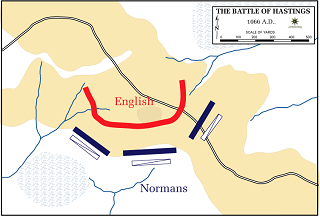William the Conqueror and His Legacy

This caused a blending of the existing Saxon language with French and the other Romance tongues, yielding an English language that is incredibly robust. It’s said that there are nuances of meaning in our language that exist nowhere else on Earth.
Because I’m one of the many people who, for better or worse, earns his living by writing in English, I share a certain fondness for William and his mission.

It may be that English is the only widely spoken language which is more commonly spoken as a second language than as a first language. However, there are problems with it which should be corrected.
Spanish and German have commissions to keep the language regular and updated. Unfortunately, English has no such commission and has been allowed to drift the result being that it is unnecessarily hard for people to learn. Also, semi literate people have been able to degrade English. For example, “healthful” has practically disappeared and subjunctives are not used when they should be.
Spelling is particularly bad. Attempts to make spelling phonetic have failed. Andrew Carnegie, the 19th century steel magnate, who is perhaps best known for his funding of the building of libraries, unsuccessfully pushed phonetic spelling. At one time, the “Chicago Tribune” used phonetic spelling. Neither attempt to get phonetic spelling was successful.
Also, there are entirely too many irregular verbs. One might suppose that the past tense of “freeze” would be “freezed”; of course it is “frozen”. That is only one of many examples.
The way plurals are formed is also irregular. Who would guess that the plural of “ox” is “oxen”? And, considering that the plural of “goose” is “geese”, why isn’t the plural of “mongoose” “mongeese”?
As a result of all these irregularities, entirely too much school time is wasted.
We also have weirdly spelled words such as “chauffeur” and “rendezvous”. Why not “shoefr” and “rondayvoo”? And why isn’t “color” “kulr”?
Interestingly, before Samuel Johnson’s time, spelling in English was not standard. People spelled however they pleased. Now, if people ever misspell a word or don’t get a verb right, it is assumed that they are uneducated. The irregularities are used to expedite snobbery.
We really need an international commission of scholars to regularize English.
Hi Frank,
“an international commission of scholars to regularize English “?!
Not in my lifetime ! Nor I hope my grandchildren’s ! The great glory of English and what makes the English speaking world different, is the flexibility and diversity of the English language.
The language both contributes to the English culture and reflects the culture. The English language evolved as an easily acquired, accessible means of communicating idea’s and emotions among traders, merchant adventurers, writers and poets and more importantly the common folk.
The elite spoke Latin and French, both rigidly grammatical languages. It was the chaotic nature of the English language which reflected the uniquely chaotic evolution of English life.
English culture reveled in eccentric, often contrary behaviour. The language was “owned” by no one. Although if it was owned by anyone, it was probably owned by the ordinary folk and dissenters more than the elite.
Shakespeare and Marlow could not not have so eloquently created their vast volumes of work in any other language. (much of which they made up).
Indeed it could be said that the concepts of ‘freedom’ so prevalent in English culture are reflected and reinforced by the chaotic and inclusive nature of our common (and evolving)language.
My own family’s heritage in England occurred when an ambitious young follower of the Duke of Normandy, killed a Saxon Thane and his sons at the battle of Hastings. He quickly gathered a small band of Norman supporters, rode to the Thanes estate, seized the land and reinforced his claim by forcibly marrying the Thane’s only remaining child and betrothed of another local land owner whom he also killed thereby consolidating a sizable landholding under his control.
His claim was recognized by the new King William, whose executive authority was acquired in much the same manner. At that time my ancestor would have spoke a French dialect. We know he could read and write some Latin. (as a younger son he was destined for the Clergy, but chose to follow the young Duke instead).
Less than 140 years later his descendants spoke in a version of English in every day life, resorting to French or Latin only on formal occasions. The Parliaments of Henry 11 were conducted in English, but recorded in French and Latin.
The evolution of English institutions and public life have always been very fluid and flexible, while remaining respectful of traditions. That’s the great strength of English culture. (Nobody’s “in charge”).
Sadly, “spell check ” may be exactly the sort of unifying spelling force you desire, although at least it’s voluntary.
George W. Bush was certainly no intellectual, but he had his moments as is evidenced by his quip :
“In my sentences I often go where no man has gone before.. I am a boon to the English language ! ”